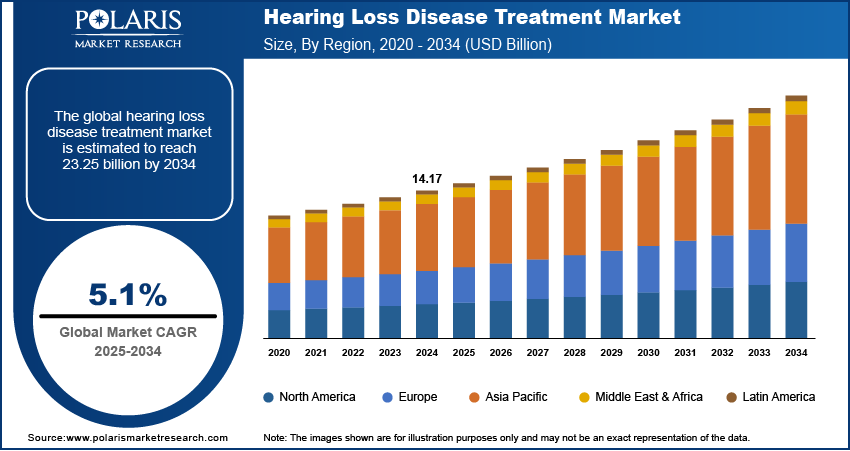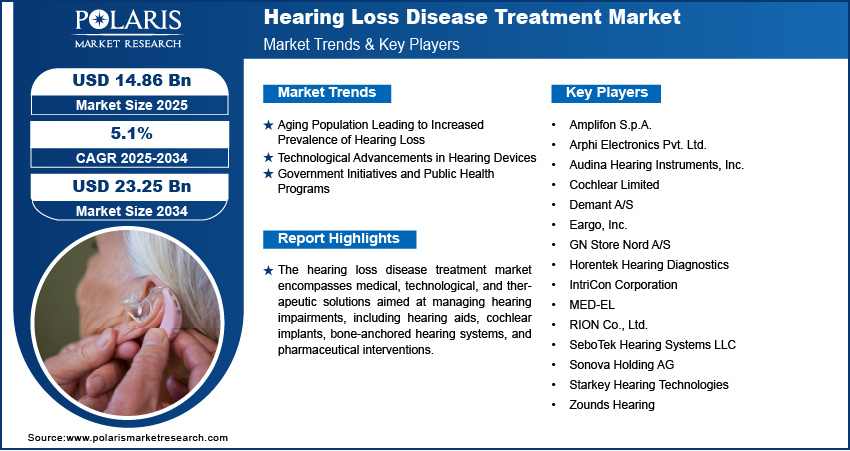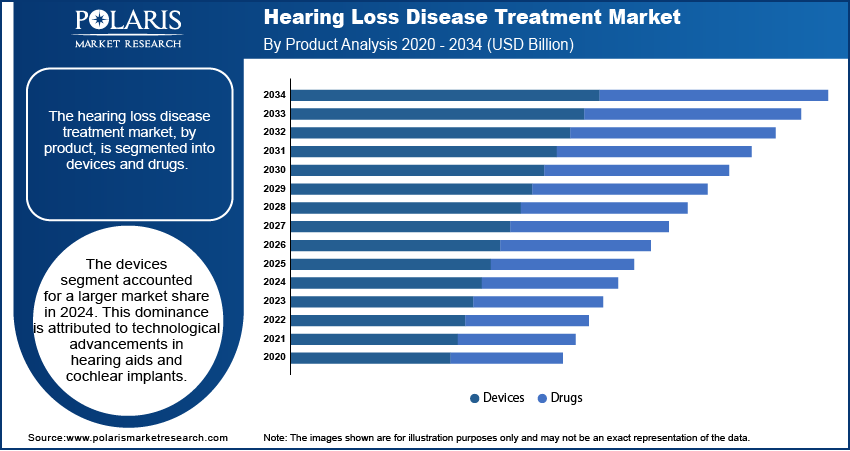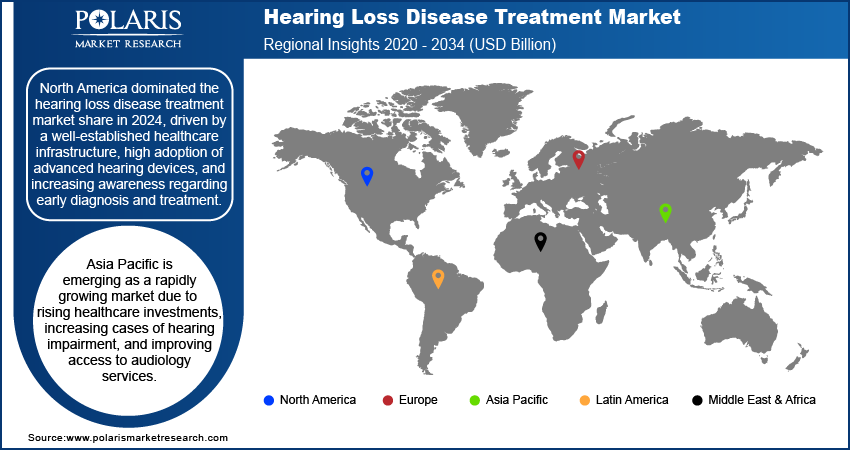
Hearing Loss Disease Treatment Market Size, Share, Trends, & Industry Analysis Report
: By Disease Type (Conductive Hearing Loss, Sensorineural Hearing Loss, Mixed), By Product, By End Use, By Region – Market Forecast, 2025–2034
- Published Date:Jun-2025
- Pages: 120
- Format: PDF
- Report ID: PM3054
- Base Year: 2024
- Historical Data: 2020-2023
Market Overview
The hearing loss disease treatment market size was valued at USD 14.17 billion in 2024, growing at a CAGR of 5.3% during 2025–2034.
Rising global prevalence of hearing impairment due to aging populations and increased noise exposure boosts the demand for hearing loss disease treatment. Additionally, hearing aid technology advancements and growing awareness of early intervention are fueling market growth.
Hearing loss disease treatment contains medical devices, pharmaceuticals, and therapies aimed at managing and treating hearing impairment. Key drivers of this industry's growth include the rising prevalence of hearing loss, increased noise pollution, and genetic factors. Growing awareness and government initiatives to improve access to hearing care services and advancements in hearing aids, cochlear implants, and regenerative medicine are also contributing to hearing loss disease treatment industry expansion. Trends such as the integration of artificial intelligence in hearing devices and the development of gene and stem cell therapies are shaping this domain landscape.

To Understand More About this Research: Request a Free Sample Report
Hearing loss, which can be caused by genetic predisposition or other medical conditions, affects millions of people globally, leading to communication difficulties and reduced quality of life. As a result, the demand for effective treatment solutions, including hearing aids, cochlear implants, and pharmaceutical therapies, has surged, driving innovation and investment in this sector.
Industry Dynamics
Aging Population Leading to Increased Prevalence of Hearing Loss
The global rise in the aging population is a significant driver of the hearing loss disease treatment market demand. According to the World Health Organization (WHO), in 2023, over 25% of individuals aged 60 years and above experience disabling hearing loss. As the global population continues to age, the number of individuals requiring hearing rehabilitation is projected to increase substantially. This demographic shift highlights the growing demand for effective hearing loss treatments and interventions.
The high prevalence of other age-related health issues is leading to a greater need for hearing aids, cochlear implants, and other assistive listening tools. Around the world, healthcare providers are giving more attention to senior care, promoting regular hearing check-ups and early intervention. Innovations in hearing technology, including easy-to-use devices and remote support services, are making treatment more accessible and appealing for older users. Together, these factors are growing medical needs, better public understanding, and improved healthcare systems, which are contributing to the rising use of hearing loss treatments in aging populations.
Technological Advancements in Hearing Devices
Modern hearing aids incorporate features such as artificial intelligence, connectivity with personal devices, and improved sound processing capabilities. Such integration of AI allows for real-time sound environment analysis, enhancing user experience. These advancements make hearing devices more effective and user-friendly to patients, encouraging higher adoption rates among individuals who have hearing impairment.
Hearing devices are becoming more discreet and comfortable, and many models offer rechargeable batteries, eliminating the need for frequent replacements and making them more convenient for users. Customizable settings also allow wearers to adjust their devices based on personal preferences and listening environments, improving overall satisfaction. Further, growing access to these technologies through online platforms and retail outlets is making them more widely available. Due to innovations, awareness of hearing health is rising. Therefore, more people are seeking timely diagnosis and treatment.

Segmental Insights
By Product Analysis
The devices segment accounted for the major share of 61.9% in 2024. This dominance is attributed to technological advancements in hearing aids, cochlear implants, and bone-anchored hearing systems, which enhance user experience and efficacy. For instance, modern hearing aids offer features such as wireless connectivity, noise reduction, and artificial intelligence integration, making them more appealing to users. Cochlear implants have also seen significant improvements, providing options for individuals affected by severe to profound hearing loss. These innovations have led to increased adoption of hearing devices globally.
The drugs segment is projected to reach USD 5.05 billion by 2034. This surge is driven by ongoing research and development efforts aimed at introducing novel pharmacological treatments for various types of hearing loss. Emerging therapies, such as gene and stem cell treatments, are under investigation and hold promise for future applications. The drugs segment is anticipated to expand its presence in the hearing loss treatment market as these innovative treatments progress through clinical trials and receive regulatory approvals.
By Disease Type Analysis
The sensorineural hearing loss segment dominated the market and was valued at USD 9.31 billion in 2024. This dominance is attributed to factors such as aging populations and increased exposure to noise pollution, leading to a higher incidence of sensorineural conditions. Sensorineural hearing loss (SNHL) is the most common form of permanent hearing loss, resulting from damage to the inner ear (cochlea) or the auditory nerve. This condition can be caused by aging (presbycusis), noise exposure, genetic predisposition, ototoxic drugs, or viral infections. Unlike conductive hearing loss, SNHL is often irreversible, making assistive devices such as hearing aids and cochlear implants essential for patients. Advances in digital hearing aid technology, including AI-driven sound processing and noise cancellation features, are significantly enhancing the quality of life for individuals with SNHL. Cochlear implants, which bypass damaged inner ear structures to directly stimulate the auditory nerve, have become a viable option for patients affected by severe to profound hearing loss. Therefore, this segment is witnessing significant research and development in regenerative medicine, including gene and stem cell therapies aimed at restoring auditory function, leading to market growth.
By End Use Analysis
The ambulatory clinics segment is projected to register a CAGR of 5.89% during the forecast period. Ambulatory clinics, which provide outpatient care, are playing an increasingly important role in the global hearing loss treatment market. These clinics focus on delivering cost-effective and efficient healthcare solutions for individuals having hearing impairments, offering services like hearing tests, fitting of hearing aids by hearing aid dispensers, and routine follow-up appointments. Ambulatory clinics are often more accessible than hospitals, with shorter wait times and more affordable services, making them a preferred choice for many patients suffering from mild to moderate hearing loss. In addition to diagnostic services, ambulatory clinics offer preventive care, including educational programs on hearing protection and early intervention strategies.
The hospitals segment is estimated to hold a significant market share in 2034. Hospitals are key end users, as they provide a comprehensive range of diagnostic and therapeutic services for patients suffering from hearing impairments. The hospital setting is also a critical environment for research and clinical trials focused on new hearing loss treatments, such as gene therapy, stem cell treatments, and innovative pharmacological interventions. Many hospitals are equipped with new technologies and specialized facilities, enabling them to offer advanced solutions for hearing restoration. As the demand for comprehensive hearing loss treatments continues to rise, hospitals are increasingly investing in advanced hearing diagnostic equipment and therapeutic devices.

Regional Analysis
In 2024, the North America hearing loss disease treatment market accounted for 37.1% of global share, driven by a well-established healthcare infrastructure, high adoption of advanced hearing devices, and increasing awareness regarding early diagnosis and treatment. The region benefits from strong government initiatives, insurance coverage for hearing aids and cochlear implants, and a growing elderly population, which significantly contributes to the demand for hearing loss treatments.
US Hearing Loss Disease Treatment Market Insight
The US, in particular, dominated the regional market, capturing 78.3% regional share. This dominance is attributed to the well-established healthcare infrastructure that supports early diagnosis and access to advanced treatments. High healthcare spending, strong insurance coverage, and favorable reimbursement policies make hearing care more accessible to patients. Additionally, the US has a high prevalence of age-related hearing loss, driven by an aging population and increased exposure to occupational and recreational noise.
Europe Hearing Loss Disease Treatment Market
The hearing loss disease treatment market in Europe is projected to reach USD 6.69 billion by 2034, owing to its combination of demographic, technological, and policy-related factors. The aging population across countries such as Germany, France, and Italy is a key contributor, as older adults are more prone to hearing impairment. Increased public awareness and early screening initiatives supported by government health agencies are encouraging timely diagnosis and treatment. Additionally, advancements in hearing aid technology and wider availability through both public healthcare systems and private providers are improving accessibility. For example, in the UK, the National Health Service (NHS) provides free hearing aids and related services, promoting widespread use.
Asia Pacific Hearing Loss Disease Treatment Market
The hearing loss disease treatment market in Asia Pacific is estimated to grow at a significant CAGR of 5.85% during the forecast period. This is due to rising healthcare investments, increasing cases of hearing impairment, and improving access to audiology services. Countries such as China, Japan, and India are witnessing a higher demand for hearing loss treatments due to aging populations and greater awareness of hearing health. Government initiatives, such as India's National Programme for Prevention and Control of Deafness, are expanding screening and treatment programs, particularly in rural areas. Additionally, the availability of cost-effective hearing devices and increasing collaborations between local and international companies are enhancing hearing loss disease treatment industry growth in the region.

Key Players and Competitive Analysis Report
The hearing loss disease treatment market is highly competitive, with several key players working to develop innovative solutions. Firms focus heavily on research and development to improve the efficiency, comfort, and connectivity of hearing solutions. New entrants and smaller players are also contributing by introducing affordable and user-friendly devices. Many companies are forming partnerships with hospitals and hearing clinics to expand their reach. Additionally, there are growing investments in digital technologies, such as AI-powered hearing aids and smartphone-compatible devices, to attract consumers.
List of Key Companies
- Acousia Therapeutics
- Astellas Pharma
- Audifon Gmbh
- Audina Hearing Instrument
- Novartis
- Otonomy
- Pipeline Therapeutics (Contineum Therapeutics, Inc.)
- Sensorion
- Sonova Holding Ag
- Ws Audiology
Industry Developments
- August 2024: Sonova launched the Sphere Infinio hearing aid. It utilizes real-time artificial intelligence to improve speech clarity amidst background noise.
- May 2024: Novartis entered agreement to acquire Mariana Oncology, strengthening radioligand therapy pipeline.
- September 2021: Neocustic signed a partnership with Audifon, the hearing aid manufacturer that develops and produces entirely in Germany.
Hearing Loss Disease Treatment Market Segmentation
By Product Outlook (Revenue – USD Billion, 2020–2034)
- Devices
- Drugs
- Systemic Steroids
- Antiviral Medication
- Vasodilators
- Others
By Disease Type Outlook (Revenue – USD Billion, 2020–2034)
- Conductive Hearing Loss
- Sensorineural Hearing Loss
- Mixed
By End Use Outlook (Revenue – USD Billion, 2020–2034)
- Hospitals
- Otology Clinics
- Ambulatory Clinics
By Regional Outlook (Revenue – USD Billion, 2020–2034)
- North America
- US
- Canada
- Europe
- Germany
- France
- UK
- Italy
- Spain
- Netherlands
- Russia
- Rest of Europe
- Asia Pacific
- China
- Japan
- India
- Malaysia
- South Korea
- Indonesia
- Australia
- Vietnam
- Rest of Asia Pacific
- Middle East & Africa
- Saudi Arabia
- UAE
- Israel
- South Africa
- Rest of Middle East & Africa
- Latin America
- Mexico
- Brazil
- Argentina
- Rest of Latin America
Hearing Loss Disease Treatment Market Report Scope
|
Report Attributes |
Details |
|
Market Size in 2024 |
USD 14.17 billion |
|
Market Value in 2025 |
USD 14.81 billion |
|
Revenue Forecast by 2034 |
USD 23.54 billion |
|
CAGR |
5.3% from 2025 to 2034 |
|
Base Year |
2024 |
|
Historical Data |
2020–2023 |
|
Forecast Period |
2025–2034 |
|
Quantitative Units |
Revenue in USD billion and CAGR from 2025 to 2034 |
|
Report Coverage |
Revenue Forecast, Market Competitive Landscape, Growth Factors, and Trends |
|
Segments Covered |
|
|
Regional Scope |
|
|
Competitive Landscape |
|
|
Report Format |
|
|
Customization |
Report customization as per your requirements with respect to countries, regions, and segmentation. |
FAQ's
The hearing loss disease treatment market size was valued at USD 14.17 billion in 2024 and is projected to grow to USD 23.25 billion by 2034.
The market is projected to register a CAGR of 5.1% during the forecast period.
North America had the largest share of the market in 2024.
A few key players in the hearing loss disease treatment market include Amplifon S.p.A.; Arphi Electronics Pvt. Ltd.; Audina Hearing Instruments, Inc.; Cochlear Limited; Demant A/S; Eargo, Inc.; GN Store Nord A/S; Horentek Hearing Diagnostics; IntriCon Corporation; and MED-EL.
The devices segment accounted for a larger share of the market in 2024.
The sensorineural hearing loss segment accounted for the largest share of the market in 2024.
Hearing loss disease treatment refers to medical, surgical, and technological interventions designed to manage and improve hearing impairments. Treatment options vary based on the type and severity of hearing loss and include hearing aids, cochlear implants, bone-anchored hearing systems, and assistive listening devices. In cases where medical conditions such as infections or otosclerosis cause hearing loss, pharmaceutical treatments and surgical procedures may be necessary. Audiological rehabilitation, speech therapy, and counseling also play a role in improving communication abilities. The primary goal of these treatments is to enhance hearing function, improve quality of life, and prevent further auditory deterioration.
A few key trends in the market are described below:
